-
Posts
1,991 -
Joined
-
Last visited
-
Days Won
38
Content Type
Profiles
Forums
Downloads
Gallery
Posts posted by Ton Plomp
-
-
Name: Mercurial Provider
Submitter: Ton Plomp
Submitted: 25 Feb 2012
Category: *Uncertified*
LabVIEW Version: 2011
License Type: BSD (Most common)
This toolkit allows you to directly communicate with you Mercurial repository, from within the LabVIEW project environment.
This toolkit acts as an extension of the supplied LabVIEW SCC interface in LabVIEW professional.
The toolkit allows you to commit, push, tag changesets. Has support for adding Issue tracking IDs.
-
 1
1
-
-
A side note: when I'm in this situation, I create two installers:.....
Do you make sure that both installers have the same component code (unique installer ID)?
If I would make two of these installers I would make the full version one version higher than the base light installer.
This makes sure that if the user installed base light but needed full can use the upgrade method to get the full with all the additional components.
Base Ligth 1.2.3
Full 1.2.4
Greetings,
Ton
-
Here's a link to Ram's presentation and examples, where he shares a lot good stuff about XControls.
Unfortunately that link isn't accessible by all (for instance ME).
Ton
-
I added the info to the LabVIEW Wiki page on XControls
-
 2
2
-
-
I'm running WinXP
Ton
-
I was able to create such a VI with the following settings:
Here's the code I used for making it 10 pixels high:
And heres the FP overlaying the code:
And I would just ignore the error 1... (see attachment). (The reason your resize is ignored, is because the resizing outside the while loop generates an error, preventing the resize/move inside the event loop to happen.)
Ton
-
As soon as I read the initial post I was thinking about TotalCommander that has several quite popular patches (TC PowerPack is my favorite), that includes a lot of customization that allows you to integrate the most idiotic features (virtual HDs, torrent downloaders, diff tools, EXIF readers etc.).
Porting this idea to LabVIEW I can think of codesets (OpenG, MGI) additional IDE enhancements (G#, JKI Right Click Framework, or a toolbar framework).
Additionally NI has added things that could have been in a community patch (the Project environment for instance).
What would we want in such a toolset?
Ton
-
Using a full service (like Bucket, Kiln, Google Code, Microsoft codeplex or Sourceforge) has quite some advantages, it allows you to grant access to other people, use an issue tracker and setup a front page for your project.
Ton
-
Make sure you have the correct settings in your configuration files (global:mercurial.ini or local:.hg\hgrc):
[merge-tools]
LVMerge.args = $base $other $local $output
LVMerge.executable = C:\Program Files\National Instruments\Shared\LabVIEW Merge\LVMerge.exe
LVMerge.gui = True
LVMerge.binary = True
[merge-patterns]
**.vi = LVMerge
**.ctl = LVMerge
**.lvclass = LVMerge
**.xctl = LVMerge
**.lvlib = LVMerge
(for some reason I missed the dash in merge-tools)
Perform the following steps:
- Right click on one of the branches, select 'merge with local'
- Hit 'Next' in the Prepare to Merge dialog
- In the next dialog a note is shown '1 files were modified in both branches and must be resolved', click on the underlined resolved
- The Resolve conflicts dialog pops up.
- In the bottom theres a dropdown menu named 'Detected/merge diff tools', select LVMerge.
- Highlight the conflicting file in the Unresolved items list
- Use the Tool Resolve button
- This will launch LVMerge, which will launch the LabVIEW resolve utilities.
I'll post a HowTo on the LabVIEW Wiki Merge with TortoiseHG page.
Ton
- Right click on one of the branches, select 'merge with local'
-
You could save the cmd intermediate process creation altogether by directly piping into the (Mercurial) command line tool. And if you use the OpenG Pipe functions you could potentially even use the same single mercurial command line instance to issue many commands after each other through a pipe to the stdin and receive any response through another pipe from stdout.
I detected that Mercurial has a commandserver/pipe interface, after some debugging I got a stable 38 msec per call for the most basic call, (coming from 150 msec) so that speed improvement is pretty good.
Here's the code I ended with:
Do you know what the overhead per dll call is?
Ton
-
 1
1
-
-
If I'm not mistaken it's quite normal for companies in the US to claim all products of a employee. [citation needed]. Some discussion here.
I've never dealt with this since my employer isn't interested in the code I generally write as Open Source. There are some statements in our CAO (collective working agreement) but so vague that both the parties can make a valid claim.
Ton
-
One thing it might be is that if an error occurs you stop reading the next items.
So if your item isn't a mail item (rather an appointment) you will stop reading the other items.
Ton
-
Get terminal name is definitely wrong, just because it's correct in one case, it's not valid in all cases. (Chris mentioned typecast).
Get data name is correct to me. The code is specifically used for variants, so if you want to use is, you should package the data as a variant, in that moment the name is preserved (however you can change it using OpenG code).
Ton
-
My blog is at:
http://tononlabview.blogspot.com/
The RSS is at:
http://tononlabview.blogspot.com/feeds/posts/default
I don't write regurlarly, however things and bits I encounter will be posted there.
I plan to write tutorials as well on that blog.
Ton
-
Is it a LV-bug that the cast does not accept a cluster containing an array?
I'm not sure, however using a cast can lead to unforseen results (for instance instant memory issues)
Is it a LV-bug that the flatten to string adds 4 unwanted bytes for the arraylength while 'prepend..' is set to FALSE?Nope, the 'False' is only for the top level element (cluster), and not for any objec tinside the cluster.
Ton
-
- Popular Post
- Popular Post
I would like to see OpenG version of the default 1,2 and 3 button dialogs offered by LabVIEW with an optional timeout.
The purpose of such dialog is that it informs the user and allows him to take some action.
If the user does not respond in time a default action would be taken.
The timeout should default to '-1' meaning a timeout would never occure, the time-out would be configured in seconds, and the default button would show 'button-name[xxx]' with xxx in seconds until that action will be taken.
Any thoughts?
I'll try to come up with some protypes tomorrow. (perhaps an express VI)
Ton
-
 3
3
-
It's kinda sad to see that this LabVIEW bug isn't resolved after 4 years (and 8 updates),.
Ton
-
 1
1
-
-
It depends on the DAQ, most DAQs have a measuring rang of +-5 or +-10 Volts, but are protected against higher voltages.
You'll need to detect those higher voltages and act upon.
Another option could be adding signal conditioning that has higher damage criteria (we use dewetron, those go up to 3 kV.
Ton
-
 1
1
-
-
In reverse order my opinion:
- Mercurial API (developed by me) is an API to the mercurial command line interface, and does not handle merging or diffing, if you have set up diff properly, then the diff-vi will work.
- LVMergeHG Looks promising, however I have not used it
- Mercurial LabVIEW integration, works good for diffs and is very valuable if you want to see what changed in a file for a given changeset!
I'm working on a Project integration for Mercurial, however the LabVIEW provider for SCC is not the most stable.
Ton
- Mercurial API (developed by me) is an API to the mercurial command line interface, and does not handle merging or diffing, if you have set up diff properly, then the diff-vi will work.
-
-
We recently sent data in TDMS format to another party (sort of competition), and we decided not to mention the dataformat, jus sent the files.
Later I spoke one of there developers, and and I figured out they were using Matlab were able to open the files without any issue.
Ton
-
There's one catch, if both values are the same then greater than and smaller than aren't congruent.
However I don't really understand the algorithn, though I think that the while loop should never run more than 2 times.
Ton
-
The first flaw I could find is the following:
Resolving this doesn't fix the issue though.
What's strange is that if both of these tests are false, the while loop is stale, nother really happens and all values are constant resulting in an endless loop.
How is 20 mod 0 defined by Knuth?
Here you calculate q* and r*. But if I enter 20 mod 0 into my windows calculator it states 'operation undefind'. So the result depends on your compiler, LabVIEW returns 20 for the remainder and 0 for quotient. (sounds valid).
Ton
-
These tools look good (the location in the Data palette is good.)
One small glitch: One of the functions has a 'LabVIEW Object' input while the others have 'Object'
Ton



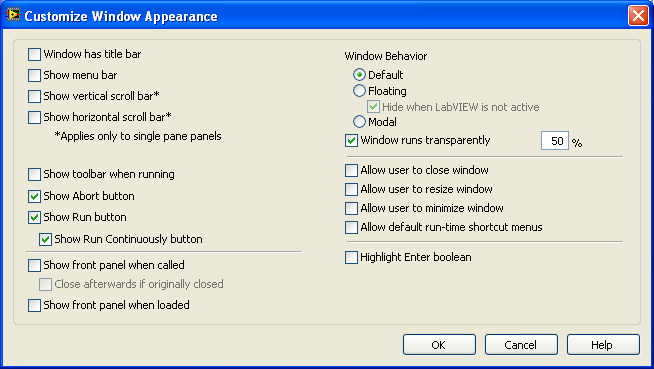
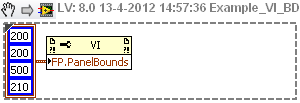
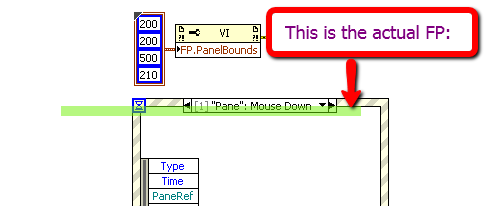
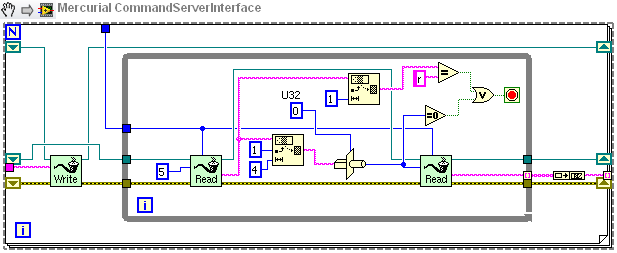

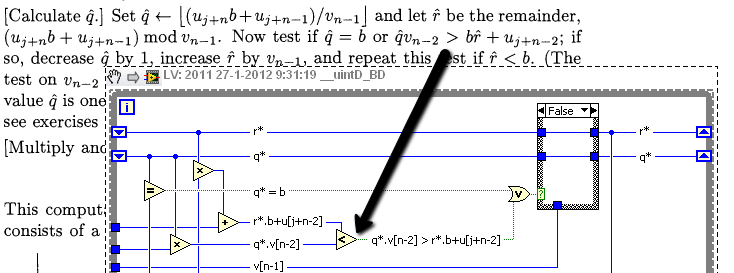
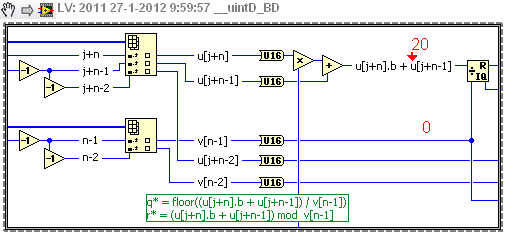
Remove a zero array
in LabVIEW General
Posted
I would use an array of waveforms instead of a 2D array, using an array of waveforms you can have an empty waveform.
Ton